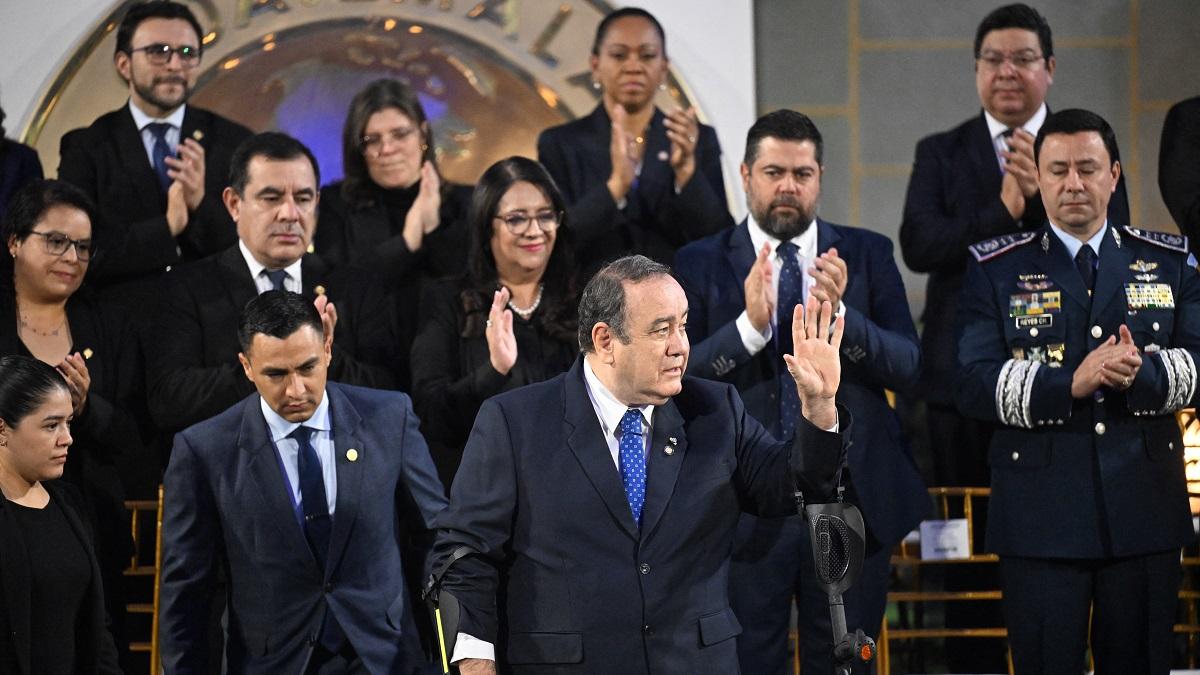The atmosphere is still tense ahead of Arevalo’s inauguration

Social Democrat Bernardo Arevalo must assume Guatemala’s presidency tomorrow, Sunday, after facing an unrelenting judicial attack on his promise to protect fragile Guatemalan democracy from corrupt elites he says cling to power.
The 65-year-old former diplomat and sociologist, who denounced the invasion as an “attempted coup”, will be sworn in at the National Theater in a solemn session of Congress that will oppose him.
As he made it to the second round in June against all odds, he avoided attempts by the prosecutor’s office to lift his immunity and annul the election results, but he faces the suspension of his Semilla party and the risk of having fewer seats for his deputies. Maneuver
Backed by the United States, the European Union, Latin American countries and international organizations, Arevalo will take over from right-wing Alejandro Giamattei, who his followers accuse of supporting Attorney General Consuelo Porras, the leader of the judicial offensive.
There will be plenty of work. Eddie Cooks, director of Citizen Action, the local version of Transparency International, told AFP, “They will govern in coexistence with prosecutors who have attacked them and affected democracy to an unimaginable level.”
Arevalo raised high expectations in a country plagued by corruption, plagued by gang violence and drug trafficking, and where six out of ten Guatemalans live in poverty.
“We are going to start a new chapter in the history of Guatemala,” Arevalo said on social network X, formerly Twitter, on the eve of his inauguration.
– “Rebuild Democracy” –
The son of Guatemala’s first democratic president, Juan José Arevalo (1945–1951), manager of social reform, the future ruler promised to turn off the taps of public money that enriched the elite, while the population suffered hardships.
One in two children under the age of five suffers from malnutrition and illiteracy is 18%. Central America’s largest economy expels thousands of people every year in search of work in the United States, whose remittances help sustain the country (20% of GDP), according to official data.
Rafael Perez, a 42-year-old graphic designer, told AFP that he did not expect “drastic changes” in the country with Arevalo’s presidency, but “hopefully the foundations will be laid for a better future.”
But to move forward socially, according to Arevalo, a “continuous and gradual struggle” must begin to protect institutions that he says have been “co-opted” by “corrupt elites,” such as the prosecutor’s office and the courts.
His strategy includes creating a commission to propose reforms to curb illegal enrichment and political clientelism in Guatemala, which ranks 30th out of 180 countries in Transparency International’s corruption ranking.
Jordan Rodas, a former human rights attorney exiled in Washington, told AFP, “You have a very important and urgent task to rebuild democracy” and achieve governance.
His experience in conflict resolution, Rodas says, can help. Arevalo is also a philosopher, studied in Israel and the Netherlands and speaks five languages.
He was born in Montevideo and lived as a child in Venezuela, Mexico, and Chile, following his father’s exile in Washington following a rebellion against progressive Jacobo Árbenz (1951–1954).
– An “embassaged” president –
For months there were fears that raids by the prosecutor’s office, which also raided the electoral court’s headquarters and confiscated voting ballots, would prevent Arevalo from taking power.
There were many detentions and deportations along the way, a flurry of legal actions by and against Arevalo, and a battery of sanctions from Washington against prosecutors, judges, officials and about 100 deputies whom he accused of corruption and undermining democracy.
The Constitutional Court had to seek guarantees for the transfer of mandate, and on Thursday also “protected” the vice president-elect, Karin Herrera, in the face of rumors of an arrest warrant.
Arevalo assures that one of the first things he will do as president will be to ask for Porras’ resignation. But analysts warn that an onslaught against them is far from over.
“They are going to ambush the president, in the first surveillance they will want to lift his immunity and remove him,” Manfredo Marroquin, co-founder of Accion Ciudadana, told AFP.
On the way to his investment, Arevalo had the decisive support of young people, very active on social networks, and indigenous people (40% of the 17.8 million Guatemalans), who protested by more than 100 people to demand the resignation of Porras.
Although he expects the onslaught against him to continue, Arevalo told AFP in December that he would rule “without fear”.
atmosphere


:quality(85)/cloudfront-us-east-1.images.arcpublishing.com/infobae/S74SNG56ZRJIU2XLNRUJ2YQXBA.jpg)
:quality(85)/cloudfront-us-east-1.images.arcpublishing.com/infobae/MCGIR6JXHJDPTA7QIKNHPLAV2I.jpg)
:quality(85)/cloudfront-us-east-1.images.arcpublishing.com/infobae/YNKWOJ3U5ZF2ZJXXHAIOSGZQKQ.jpeg)
